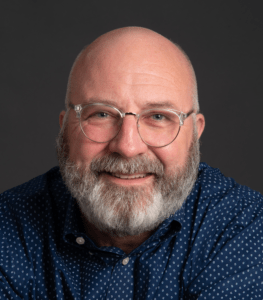The following opinion piece is a dialogue between Mark Wingfield and Amber Wylde.
Mark
I just returned from a dinner conversation with some other minister friends where we talked about how the fear of God’s judgment sneaks up on those of us who know better.
One friend recalled a conversation that went like this: “If we change our minds on accepting gay Christians, will God be angry with us?”
One told the story of a related conversation with his wife:

Mark Wingfield
“If our son were to be gay, would we still love him?”
“Yes, absolutely.”
“Then why aren’t we willing to love other parents’ children the same way we would love our own?”
And then I left dinner and was scrolling through Twitter when I saw this: A photo of a young man weeping as he embraced someone else with the commentary above saying, “At NYC Pride yesterday, we told gay people that Jesus loves THEM. Tears were not an uncommon response. 86% of gay people grow up religious, and many are rejected by their faith communities instead of loved.”
Made me think of the Free Mom Hugs tour, where moms go from event to event to offer physical embrace to adult children whose parents have rejected them out of fear of God’s wrath.
Nothing motivates quite like the fear of God’s wrath. It’s a tale as old as time.
“Nothing motivates quite like the fear of God’s wrath. It’s a tale as old as time.”
But are we, indeed, sinners in the hands of an angry God?
I don’t think so. In fact, I believe this is a theological fallacy that has done immeasurable harm.
Puritans and evangelicals love to believe we must take care not to offend this angry God. Their starting point is wrath. Of course, Calvinists take that wrath and turn up the heat a few notches to make God so angry that God’s own Son must be murdered as a blood sacrifice. God’s wrath must be satisfied.
Such a notion sounds a lot more like pagan religions than it sounds like the New Testament. These “Christian” beliefs in an angry God are not far removed from the ancients who believed human sacrifices were necessary to appease all manner of angry gods. Just because you believe in one angry God rather than a whole set of angry gods doesn’t reduce the fear factor.
One of the first Scriptures we teach children in Sunday school is 1 John 4:16: “God is love.”
And then we quickly follow that up with lessons about how anger actually is a kind of love. God is angry with us because God loves us.
This is just biblical nonsense. Because God is love, God loves us.
Amber
If 86% of gay people grow up religious, then it is likely 86% of gay people (or a percentage very close to that) grew up believing God hates them. This internalized homophobia, taught from infancy, is the most dangerous and lethal form due to the fear factor it imbeds, not only about how we live now, but about where we spend eternity.

Amber Wylde
Teaching unconditional love with one breath while proclaiming the wrath of God with the next creates a belief that God only loves us if we are good according to the tenets of whatever brand of Christianity we were raised in.
If we are good, God loves us, and if we are bad (even if that “badness” comes from something we can’t control like sexual orientation or gender identity) then God hates us.
A belief that God hates us then sows seeds of belief that we should hate ourselves.
Self-hatred, self-loathing and shame over something we cannot control or change then spirals into depression, substance abuse, self-harm and suicide.
The belief, especially for queer people, that we are sinners in the hands of an angry God, directly links to death — both by suicide for those experiencing so much oppression they can no longer continue to breathe, and by murder from those who also believe this angry God wants to punish, kill and eradicate queer people.
In 2019, the Trevor Project conducted a study that found that “LGBTQ youth who report having at least one accepting adult were 40% less likely to report a suicide attempt in the past year.”
One accepting adult. That is all it takes. Just one.
Shifting our view from an angry God we must appease to a God truly and completely full of love that does not have to be earned not only creates a much healthier mindset when it comes to the divine, it also creates a much healthier mindset when it comes to how we view ourselves and how we move through the world.
“Believing and modeling divine love saves lives.”
Even greater still, believing and modeling divine love saves lives. It eradicates shame. It lessens isolation. It sees and celebrates the good in one another.
This doesn’t happen overnight. A lifetime of fear takes intentional rewiring. It takes time and patience and grace for yourself and others in the process. And it takes surrounding yourself with people who also want to live into love over fear.
Mark
As Amber and I engaged in this dialogue, another friend posted some hard truth online, speaking specifically to clergy friends: “No matter how welcoming, affirming, accepting, loving and wonderfully incredible you and your particular church are, the BRAND that you cling to as part of your name isn’t. In fact, you represent an organization called CHURCH, that has a clear and consistent 2,000-year history of abuse and control. So when you show up at events, take over, center yourself and promote your organization, you need to realize that MANY people are triggered and harmed just by your BRAND.”
Ouch. Remember when we just wanted to get “Baptist” out of our churches’ names? This friend is right, though: The very word “church” is too often associated with anger and judgment and exclusion.
We who are working to create a better alternative do not have history on our side, even if we have Jesus on our side.
“We who are working to create a better alternative do not have history on our side, even if we have Jesus on our side.”
Some years ago, I chaired a communications team at our church as we sought to better define our brand. Being a Baptist church in Dallas comes with all sorts of baggage. We kept wanting to say, “We’re not that kind of church” and point to some of the well-known angry God promoters as our foil.
Eventually, we put a positive spin on it and began saying, “We’re a different kind of Baptist church.” Other churches across the nation picked up that language as well. It’s helpful, but we also need to make sure it’s true.
The difference we need in “church” today is not merely branding, it is theology. We need to return to the teachings and example of Jesus — not angry Jesus (that’s one story within the four Gospels) and not bloody Jesus but the Jesus who declared: “Come unto me all you who are weary and burdened, and I will give you rest.”
This would be good news not only for the LGBTQ community but for all people. Because as it turns out, how we treat gay and lesbian and transgender children of God says a whole lot about who we believe God is for everyone.
Amber
It’s true that many people, not just LGBTQ people, have walked away from the church — especially over the last seven to 10 years. Whether it’s LGBTQ inclusion, the election of Trump, the SBC fallout or the pandemic, there has been a mass exodus from Christianity in recent years. Just the words “Christian” or “church” make people cringe as the brand of church becomes less and less of anything that actually resembles Christ.
If we look at the Matthew 11:28 verse Mark mentioned in The Message translation, the wording draws fresh imagery saying, “Are you tired? Worn out? Burned out on religion? Come to me. Get away with me and you’ll recover your life. I’ll show you how to take a real rest. Walk with me and work with me — watch how I do it. Learn the unforced rhythms of grace.”
“Perhaps learning the unforced rhythms of grace is something we could all benefit from.”
Perhaps learning the unforced rhythms of grace is something we could all benefit from.
Changing our theology and brand as Christians and the church at large is something we may see little impact from in our lifetimes — but that doesn’t mean it isn’t still worth doing. Will all those people who have been driven away come running back because we suddenly figured out how to reflect Jesus a little better? Probably not. Religious trauma is not mended so easily.
But what is possible is that we begin to break the cycle of trauma and stop it from continuing. By redefining what it means to be “Christian” or “Baptist” or “church,” perhaps those currently attending or growing up in our churches won’t ever feel the need to leave. Perhaps we will begin to create a new legacy — one where people several generations from now won’t have to wonder whether we’re the good brand of Jesus or the bad.
Amber Wylde is a national speaker, community healer and the author of three books. Her newest book, Out of Focus: My Story of Sexuality, Shame and Toxic Evangelicalism, releases October 2023. As a gay woman living with the invisible disability of both Lyme disease and rheumatoid arthritis, Amber specializes in bringing messages of diversity, hope and self-acceptance to those who have been pushed to the margins. She is host of the Unashamed Love Collective — a safe haven for LGBTQ people and allies that fosters supportive community. She also leads Cultivating Community Retreats — small, intimate group gatherings that build lasting relationships with like-minded people. Learn more at Patreon.com/AmberCantornaWylde, on social media @AmberCantornaWylde or online at AmberCantornaWylde.com.
Mark Wingfield serves as executive director and publisher of Baptist News Global. He is the author of the new book Honestly: Telling the Truth About the Bible and Ourselves.


